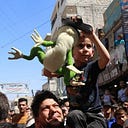Why Al-Qaeda/JFS Is Attacking Ahrar al-Sham: @charles_lister’s Take
Jabhat Fatah al-Sham (Al-Qaeda) [JFS/AQ] militants launched a series of seemingly coordinated assaults this morning on Ahrar al-Sham headquarters, checkpoints and a border crossing in the town of Khirbet al-Joz, along Turkey’s border with Syria. Additional attacks were reported on Ahrar al-Sham positions in Bdama, Darkoush, al-Zayniya and outside Jisr al-Shughour. Casualties were reported and a number of Ahrar prisoners were taken.
This is not the first time JFS (and previously, Jabhat al-Nusra) has attacked Ahrar al-Sham in Idlib, nor other opposition groups in northern Syria. And JFS’s reasoning for today’s events has been the same as previously: ‘you took some of us prisoner.’ On this occasion, JFS accused Ahrar of holding an Iraqi JFS commander in one of its prisons.
However, the purpose of these attacks appears to have been far more strategic, and calculated. Tension has been rising in Idlib for several weeks and rumors have been circling about a possible Turkish/Russian-backed air campaign against JFS across the province. Opposition groups close to Turkey have fallen under suspicion for being potential components of such an operation. A number of inter-linked dynamics are likely to have contributed towards today’s events:
- Ahrar al-Sham continues to accuse JFS of harboring “ISIS cells” after the group consumed Jund al-Aqsa in October 2016. Most recently, Ahrar al-Sham leader Ali al-Omar publicly accused JFS and its leader Abu Mohammed al-Jolani of protecting an organization that was (a) operating on behalf of ISIS and (b) was responsible for a series of assassination attacks on Ahrar commanders.
- A JFS-led initiative aimed at uniting the Jaish al-Fateh alliance in Idlib and Aleppo comprehensively failed in January 2017, in large part due to Ahrar al-Sham’s refusal to take part without the inclusion of a broader spectrum of Syria’s opposition. Instead, a majority of Ahrar’s Shura Council (15:8) voted in favor of pursuing unity with mainstream opposition groups (aside: this has also failed). This has seen JFS and its supporters launching a public attack campaign against Ahrar, accusing it of being a puppet of foreign powers (namely Turkey, which already stands accused of ‘selling’ Aleppo to Russia).
- Ahrar al-Sham remains structurally unstable and internally divided. Significant decisions have proven immensely hard to make, as two rival ‘currents’ within the group compete for influence. The more ‘progressive’ of the two currents is perceived as being close (or subservient) to Turkey; which raises concerns within JFS that it faces a potentially dangerous competitor from within a group long assumed to be a close ally. On the surface therefore, one dynamic to note is that Khirbet al-Joz and its surrounding countryside was territory that had long been controlled by hardline Palestinian Ahrar al-Sham commander Abu Khuzaymah — a figure well known for his pro-AQ leanings and who has been linked to a number of pro-Nusra/JFS conspiracies since at least mid-2015. It remains entirely possible that Abu Khuzaymah helped set the conditions for this JFS power play, to weaken Ahrar al-Sham’s border control and to minimize Turkey’s capacity to hold leverage against the opposition that could one day challenge JFS’s presence in Idlib.
- JFS has found itself targeted by an increasingly intense series of U.S. drone strikes in Idlib, since late-2016. Over 55 JFS fighters and several very senior leaders have been killed in these strikes since January 2017. While only minimally public, some prominent figures within JFS have accused elements within Ahrar al-Sham of collusion with ‘foreign powers’ over the targeting of AQ figures in Idlib.
- The issue of whether or not to attend the Astana talks on January 23 has been a sensitive issue within Syria’s armed opposition and JFS has been quietly threatening any group who agreed to participate with certain unspecified ‘consequences.’ Many opposition groups refused to attend Astana, including several prominent Free Syrian Army factions. An Ahrar al-Sham statement yesterday announced it too would decline to go to Astana and one of its 7 reasons was not to isolate anyone else who refused to participate, including JFS. Though some interpreted that to be a staunch defense of JFS, it was interpreted as an insufficiently strong rejection of a process JFS considers ‘treasonous.’
- Substantial public pressure in Idlib city recently forced Jaish al-Fateh to renounce control over service provision and civil governance activities to an elected civil council (the election was held on Jan. 17). This was interpreted as a weakening of JFS’s governing project in Idlib. Jihadi hardliners in the province accuse Ahrar al-Sham of having supported the push for the transfer of authority, as Ahrar-linked civil bodies look set to benefit politically and financially from the move.
